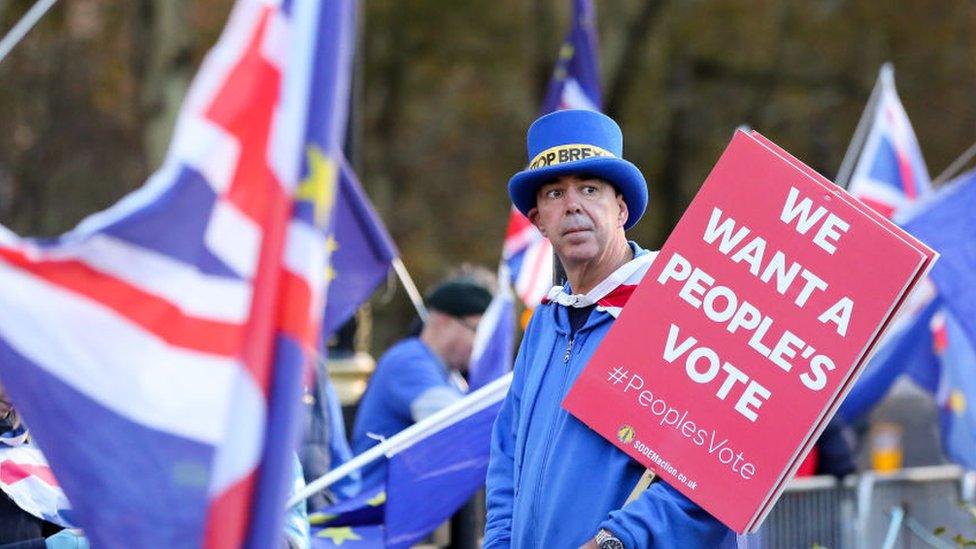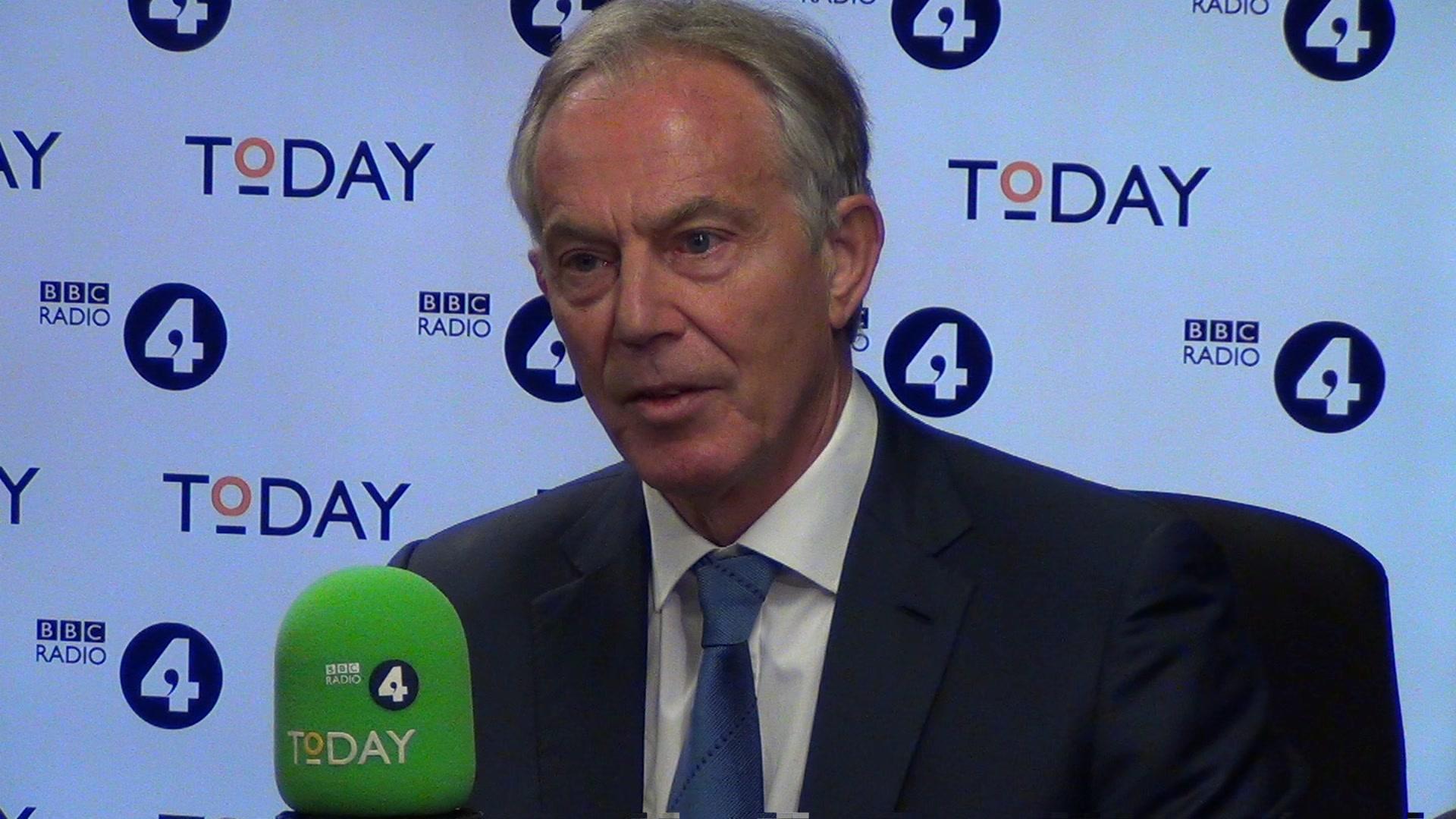Brexit: What happens next may have to be put to MPs' vote - Fox
- Published
Liam Fox: 'How do we tell the SNP that they can't have another referendum on independence?'
Parliament might have to decide what to do next if Theresa May's Brexit deal is rejected by MPs, cabinet minister Liam Fox has said.
The senior Brexiteer said the PM's deal was unlikely to pass through Parliament unless the backstop issue was resolved.
He said one option could be a "free vote" for MPs.
An alternative being widely suggested is another referendum - but Mr Fox told the BBC's Andrew Marr Show this was unlikely and would not "heal division".
Other options backed by different groups of MPs include leaving without a deal, another referendum, or Norway or Canada-style alternative deals. Norway has a very close relationship with the EU but is not a member, while Canada has an extensive trade deal with the bloc.
Education Secretary Damian Hinds has also suggested "flushing out" the levels of Parliamentary support for different Brexit options although he told BBC Radio5Live's Pienaar's Politics there was not a majority for any of them.
And Lib Dem MP Tom Brake, who is part of the anti-Brexit "Best for Britain" campaign, said: "When even Dr Fox does not rule out free votes and encourages the idea of indicative votes in Parliament, the Brexit project is clearly in jeopardy."

Analysis
By BBC political correspondent Chris Mason
What we are witnessing is a bursting out in public of conversations that have been happening for a while, at a senior level, in private.
They can be summarised like this: 'What on earth do we do next?'
One idea, now floated by three cabinet ministers in public, and others privately, is a series of so called "indicative votes".
These would flush out Parliament's view on a range of options which could include different models of Brexit: something akin to Norway's relationship with the EU for instance, or Canada's looser one. Another referendum and no deal are other possibilities.
Some ponder doing this before the vote on the prime minister's deal, in the hope it highlights that her plan is the only workable Brexit deal achievable now.
"Things are not as hopeless as they look," one cabinet minister told me.
But when I wished them a merry Christmas and a happy new year, that word 'happy' was met with a wry smile. None of this is remotely straight forward.

On the possibility of another referendum, International Trade Secretary Mr Fox said one could result in a narrow Remain win on a lower turnout, in which case, "People like me will be immediately demanding that it's best of three - where does that end up?"
It comes after Theresa May accused former Labour PM Tony Blair of undermining Brexit negotiations by calling for another referendum amid continuing calls for one to be held to solve the impasse over the UK's exit from the European Union.
Two of Mrs May's key allies - chief of staff, Gavin Barwell, and her effective second-in-command David Lidington - distanced themselves from reports they were involved in planning for a new referendum.
On Thursday about 10 Labour MPs met Mr Lidington to argue for another public vote.
Mr Lidington tweeted, external that he had told the Commons last week that another referendum would be "divisive" and would not guarantee a "decisive" ending to the debate.
Mr Barwell also used Twitter to say, external he did not want another referendum and was not planning one.
Mrs May met EU leaders on Thursday - after postponing a Commons vote on the withdrawal deal she has negotiated, fearing its heavy defeat. The government says the Commons vote will go ahead in January, as talks continue with the EU on the issue of the Irish border "backstop".
Confused by Brexit jargon? Reality Check unpacks the basics.
The backstop is an insurance policy in the withdrawal deal to prevent the return of a hard border with Northern Ireland if no trade deal is reached - but many of Mrs May's MPs say they cannot support it, arguing it would keep the UK tied to EU rules indefinitely and curb its ability to strike trade deals.
EU leaders have said the deal is "not open for renegotiation" - but that there could be some further clarification.
Mr Fox said talks would continue over Christmas and the new year. He said it was "clear" that the EU understood the problem, and it was now a question of finding a "mechanism" that would remove MPs' concerns, without which, he suggested it would not be worth putting it to a Commons vote "knowing it would be rejected".
If the deal could not get through the Commons, he said: "Parliament would have to decide on the alternatives."
Tony Blair tells Today the EU would help the UK remain if it was "prepared to think again"
Meanwhile, Labour frontbencher Andrew Gwynne told the BBC his party would be trying to bring the MPs' "meaningful vote" on the deal forward to this week.
The Labour leadership is under pressure from other opposition parties to call for a vote of no confidence in the government.
But Mr Gwynne said: "We can't move to the next stage until Parliament has decided whether or not to back the prime minister's deal."
Asked whether his party would campaign for Brexit under a Labour deal if there were to be another referendum, he said: "Let's wait and see. These things are moving very quickly.
"We are a democratic party and we will put our decision to the party members in a democratic way before we decide what the next steps are."
Labour's official position is to argue for a general election if Mrs May's deal cannot get through the Commons but to keep all options open if that doesn't happen - including another referendum.
Anti-Brexit Labour backbencher Chuka Umunna told the BBC it was time to "clear the decks" and hold the MPs' vote on the deal before moving on to "consider the other options".
He said there was no majority for another referendum in the Commons at the moment but said: "I think the position of members of Parliament will change, according to what happens."
- Published9 July 2019

- Published14 December 2018

